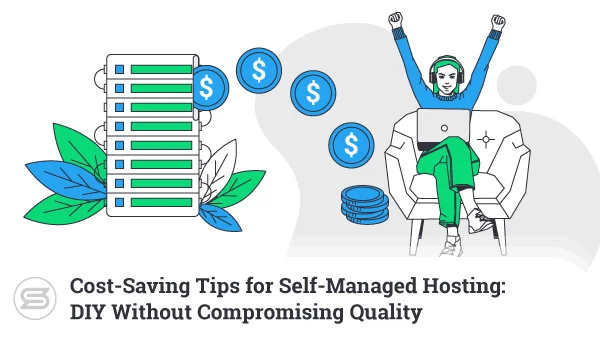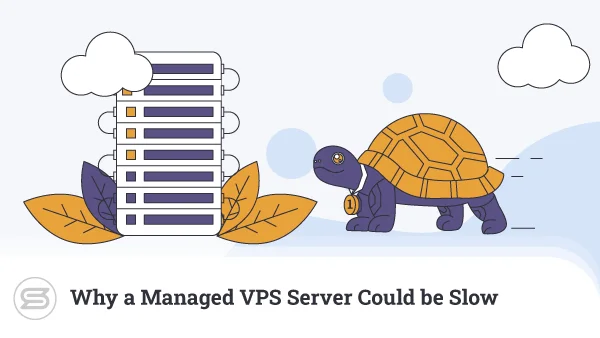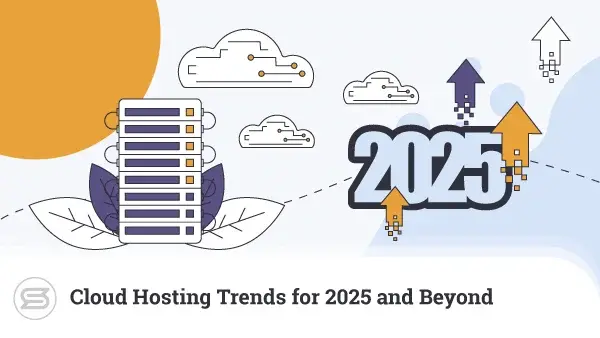In today’s ever-evolving digital economy, managed Virtual Private Server (VPS) hosting has become integral to the success of Non-Fungible Token (NFT) marketplaces. The service provides a fine balance between shared hosting and dedicated servers, offering dedicated resources to individual virtual servers.
As such, VPS solutions can meet the scalability and security demands of NFT marketplaces. They also enable efficient transaction handling and ensure a seamless user experience. Managed VPS hosting takes everything a step further by offering to take care of all technical aspects of your server. This way, it relieves NFT marketplace owners of management responsibilities.
In addition, most managed VPS hosting plans are highly scalable, allowing you to get more resources and upgrade your service whenever you see larger demands. This is excellent for NFT marketplaces as they constantly see unexpected booms. With a VPS, you can enhance security through regular audits, updates, and features like firewalls, DDoS protection, compartmentalization, and more.
In this article, we’ll show you how to select the right VPS configuration for your NFT marketplace, how managed VPS differs from other hosting options, how to set up your VPS, and much more.
Let’s dive right in!
Selecting the Right VPS Configuration for NFT Marketplaces
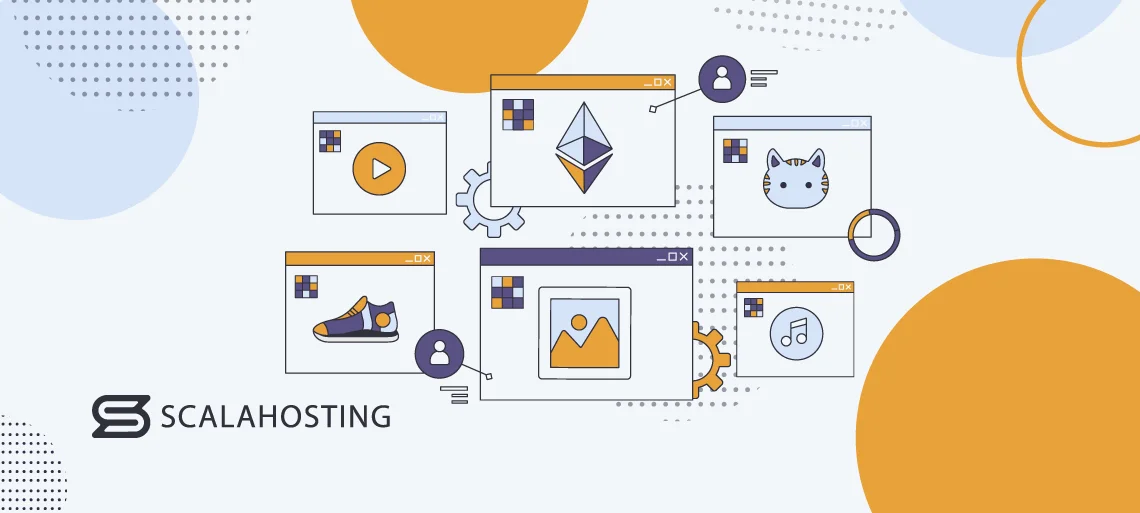
NFT marketplaces require a carefully tailored VPS configuration to ensure optimal performance, security, availability, and scalability.
Here are some factors you should consider when choosing the right solution for your project:
- CPU Performance: You must consider the processing power needed to handle NFT transactions, especially during peak periods. The recommended processor is a multi-core, high-performing processor with a clock speed of at least 2.5GHz. This is the minimum requirement, so you can’t go wrong if you get more.
- RAM Allocation: RAM is the part of your server that stores information you need to use quickly. Opening programs, running processes, accessing files, and many other similar tasks are all handled by this component. You’ll need a lot of RAM to run a complex program. The recommended amount for NFT marketplaces is at least 4GB.
- Storage: Marketplaces are usually busy and handle a lot of traffic at once. You’ll need an appropriate storage system to be able to meet demands. The recommended storage system is SSD, with NVMe being an even faster and better option. Choosing SSD or NVMe storage will also help with swiftly storing and retrieving NFT metadata and images. You’ll never know how many NFTs you’ll need to keep in your marketplace, but a good starting point is getting at least 10GB.
- Network Bandwidth: High network bandwidth ensures quick data transfers, seamless interactions, and fast asset transfers. You must get a good amount for your NFT marketplace to ensure a good flow between buyers and sellers. The best option for you here is to get a managed VPS plan with unmetered bandwidth.
- Security Measures: NFT marketplaces exist and work entirely online, so their security is crucial. Look for a VPS service that offers built-in features like firewalls, DDoS protection, strong encryption, and regular audits to ensure the well-being of your marketplace.
- Traffic Management: Scalable VPS services help you handle huge spikes in traffic during high-profile drops, promo events, and any other situation where you see increased demands. Make sure you can easily secure more resources from your provider when you need them, which won’t be hard as most managed VPS hosts are highly scalable.
Now, let’s take a look at some of the scalability options you can choose from with managed VPS hosting.
Scalability Options
- Vertical Scaling: This option allows you to increase resources like CPU, RAM, and storage as your traffic demands grow. It involves adding more hardware components to your current server configuration so that you can always secure the resources you need.
- Horizontal Scaling: Also known as a server cluster, horizontal scaling involves adding more web nodes to your server to increase its power. This option distributes the load across multiple servers instead of improving the existing one. So, instead of one machine, you’ll be utilizing two or more.
- Load Balancing: This involves using load balancing mechanisms to distribute traffic evenly across a set of resources that support an application. It prevents bottlenecks during peak periods.
By considering CPU, RAM, storage, network requirements, and scalability options, you can tailor your VPS to meet the demands of your NFT marketplace. This will also ensure your online project is ready for growth and success.
Managed VPS Hosting vs. Other Hosting Options for NFT Marketplaces
This section will compare VPSs with other web hosting options for NFT marketplaces so you can see why virtual servers are the best solution. We’ll put all services against each other in a few crucial categories so you can determine which option suits you most.
Resource Allocation
- VPS Hosting: Virtual servers share physical resources, but each user gets a dedicated portion of the CPU, RAM, and storage. It offers isolated resources at a fraction of the cost.
- Cloud Hosting: The resources are distributed across a network of virtual servers, which is good for scaling.
- Dedicated Servers: The entire physical server belongs to one user, and it is under their control. It is the most expensive web hosting service.
Scalability
- VPS Hosting: Offers excellent opportunities, which include both vertical and horizontal scaling. You can also upgrade your resources whenever you need them and downgrade when the demand is lower.
- Cloud Hosting: This is also great for scalability, as it allows you to scale both up and down.
- Dedicated Servers: Scaling dedicated servers is difficult, costly, and time-consuming. It involves hardware updates and is not flexible for unexpected scalability needs.
Performance
- VPS Hosting: Provides excellent performance that can handle tens of thousands of monthly visitors. Offers dedicated resources to each user and prevents performance fluctuations from other people on the server.
- Cloud Hosting: Offers dynamic resource allocation and is great for handling variable workloads. However, it involves a more hands-on experience from the user, which might take you away from more important business-related tasks.
- Dedicated Servers: Come with the highest level of performance as they only house one user. However, they’re quite expensive and best suited for super-large enterprises with massive transaction volumes. Otherwise, they’re not worth the money.
Costs
- VPS Hosting: Offers excellent value for money and the perfect balance between cost and power. The pricing is predictable, and there are no unexpected or hidden fees.
- Cloud Hosting: Offers a pay-as-you-go pricing model but is more expensive than VPS hosting, especially for high resource usage. Even though it’s costlier, it still provides similar resources to a VPS.
- Dedicated Servers: It is the most expensive option and can go into hundreds of dollars a month. It also requires a significant investment in hardware.
Security
- VPS Hosting: Superb security with isolated environments for each user. Both the host and the user take care of security, which adds another layer of protection to your NFT marketplace.
- Cloud Hosting: The data is distributed across multiple servers, and some cloud providers offer additional features.
- Dedicated Servers: Come with the highest levels of security because the whole server is assigned to one user. However, the user is responsible for the server security.
Management and Control
- VPS Hosting: You can get managed and unmanaged services. You’ll get full root access to your server and the ability to install software and apps of your choosing.
- Cloud Hosting: Managed cloud hosting services often handle infrastructure management, which is less than what managed VPS handles. You’ll have to be more involved in server management.
- Dedicated Servers: You have full control over your server but have to manage everything yourself or hire a professional. It requires technical expertise and skills for setup and maintenance.
Overview
As you can see, VPS hosting emerges victorious in quite a few categories. Let’s summarize:
- Control: VPS gives you enough control to allow you to install your preferred software and apps. You can customize your portion of the server however you want.
- Performance: VPS is the perfect middle ground between shared and dedicated hosting, offering each user fast performance and dedicated resources. The only time that buying a dedicated server makes sense is when you have a huge NFT marketplace with millions of monthly visitors.
- Security: This hosting service is much more secure than shared hosting. You also won’t have to set up everything yourself as you would with a dedicated server since your provider will equip you with all the security features you’ll need.
Setting Up NFT Marketplace Environments on VPS
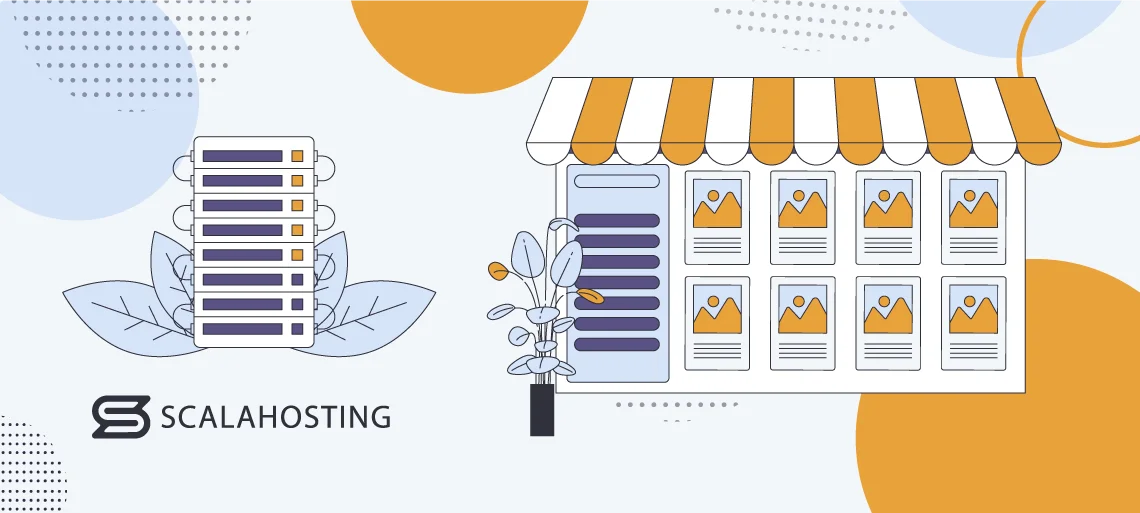
In this portion of the article, we’ll provide you with a comprehensive guide that shows how to set up a secure and scalable NFT marketplace environment on a VPS server, how to configure your OS, databases, and web server for NFT transactions, and how to implement security measures and access control.
This is what you’ll need to do:
Choose a Suitable VPS Provider
Carefully pick which VPS provider you’ll use for your NFT marketplace. Make sure it offers reliable and scalable performance, robust security, stable server performance, a sound uptime guarantee, and 24/7 customer support.
A provider that offers all the features we mentioned above is ScalaHosting. You can use our services to create a powerful and reliable NFT marketplace environment. You can count on rock-soilid security as our packages come with a unique security system called SShield. SShield blocks 99.998% of attacks, offers automatic notifications in case of a hack, and uses AI to detect malicious behavior.
Select and Configure the OS
You need to decide which operating system you’ll use. It’s best to choose a secure and well-supported OS like Ubuntu, CentOS, or Debian for your NFT marketplace.
These OS instances are compatible with a wide range of apps and software and will make it easier for you to integrate blockchain technology, wallets, and other similar programs. Ensure that your OS is always up to date once you install it.
Database Configuration
Choose a reliable and scalable database management system such as MySQL or PostgreSQL. Configure it to handle the anticipated transaction load. Should you anticipate more in the future, make changes to your settings accordingly. You also need to set up security measures for your database, such as:
- Strong user authentication (2FA and such);
- Robust encryption;
- Regular database backups.
Web Server Configuration
Pick a powerful web server like Apache or Nginx and configure it to handle HTTPS for secure data transmission. Optimize the server’s performance by doing the following:
- Use caching mechanisms to boost speed.
- Implement a Content Delivery Network (CDN) for fast global content distribution.
- Configure the server for load balancing.
Set Up NFT Transaction Handling
- Choose a blockchain platform compatible with NFT standards. For example, use Ethereum for ERC-721 tokens.
- Code and test smart contracts.
- Use load balancing to distribute transaction loads.
Security Measures
Implement robust security measures to protect your NFT marketplace and follow NFT best practices, which we will cover below.
Access Control
Access controls are critical for the safety of your NFT marketplace as they prevent unauthorized individuals from reaching your network.
To make sure your access control is done right, do the following:
- Implement secure user authentication mechanisms like OAuth and JWT;
- Enforce strong password policies;
- Use Role-Based-Access Control (RBAC) to manage user permissions.
Regular Backups
Regular backups are crucial for those who don’t want to lose their data. You can automate your backups and ensure they’re done frequently and stored securely.
Constant Updates and Patches
Now that you have everything set up, you must always keep an eye out for new updates and patches for your software and apps. If you use managed VPS, the provider takes care of some of the system updates for you.
Blockchain Integration for NFTs
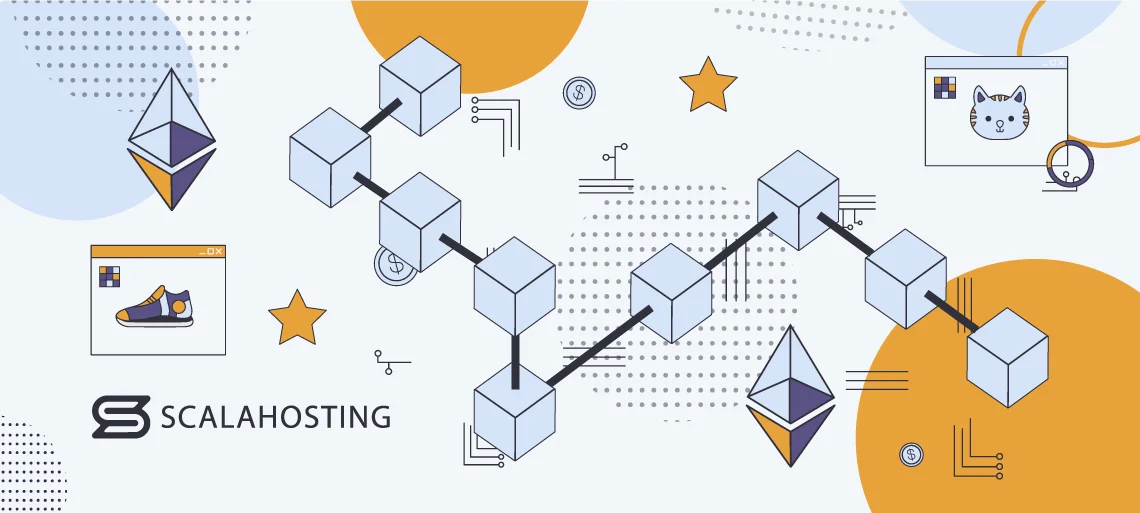
Integrating blockchain technology into NFT marketplaces on a VPS involves using the power of smart contracts and decentralized ledgers, which offer secure and transparent NFT creation, validation, and transactions.
To set up blockchain technology on your VPS, do the following:
- Choose a Blockchain Platform: Find a platform that supports NFT standards and aligns with your goals. Ethereum, Binance Smart Chain (BSC), Flow, Solana, and Polygon are popular choices.
- Set Up a VPS Environment: Follow the steps in the previous section to set up your VPS.
- Install and Configure Blockchain Node: Install the blockchain node software on your VPS, synchronize it with the blockchain network, and configure it to support NFT creation and transactions.
The Role of Smart Contracts
Smart contracts act as self-executing agreements and embed ownership rules and validation criteria directly into the NFT. They have a decentralized nature and ensure transparent and tamper-proof validation, with ownership details recorded on the blockchain ledger.
In other words, they show who owns the NFT. You can deploy smart contracts on the blockchain through your VPS. Some of the most popular standards for NFT smart contracts include Ethereum’s ERC-721 and ERC-1155.
Decentralized Ledgers
You can use decentralized ledgers to provide complete transparency of your NFT transactions. They will store all your NFT transactions and are secure enough so that tampering is rare. These ledgers also remove the need for intermediaries in selling and purchasing NFTs, enhancing the peer-to-peer nature of these transactions.
Every transaction is recorded on the blockchain, which reduces the risk of fraud and provides you with an auditable history of ownership transfers.
Popular Blockchain Platforms for NFTs
Let’s find out more about the most popular blockchain platforms for NFTs that you can use to set up your marketplace.
- Ethereum: This platform is the leading choice for NFTs due to its mature ecosystem and widely adopted standards, like the ERC-721 and the ERC-1155.
- Binance Smart Chain (BSC): BSC offers a cost-effective alternative with faster transactions. It’s suitable for NFT projects that need efficiency and affordability.
- Flow: Flow is a blockchain platform designed for scalability. It’s great for projects like NBA Top Shot that need high-performance environments.
- Solana: This blockchain is known for its low transaction costs and high throughput. It’s ideal for up-and-coming projects that need speed and lower prices.
- Polygon (formerly Matic): Polygon is a Layer 2 scaling solution for Ethereum and combines Ethereum’s security with cheaper and faster transactions.
Security Best Practices for NFT Marketplaces
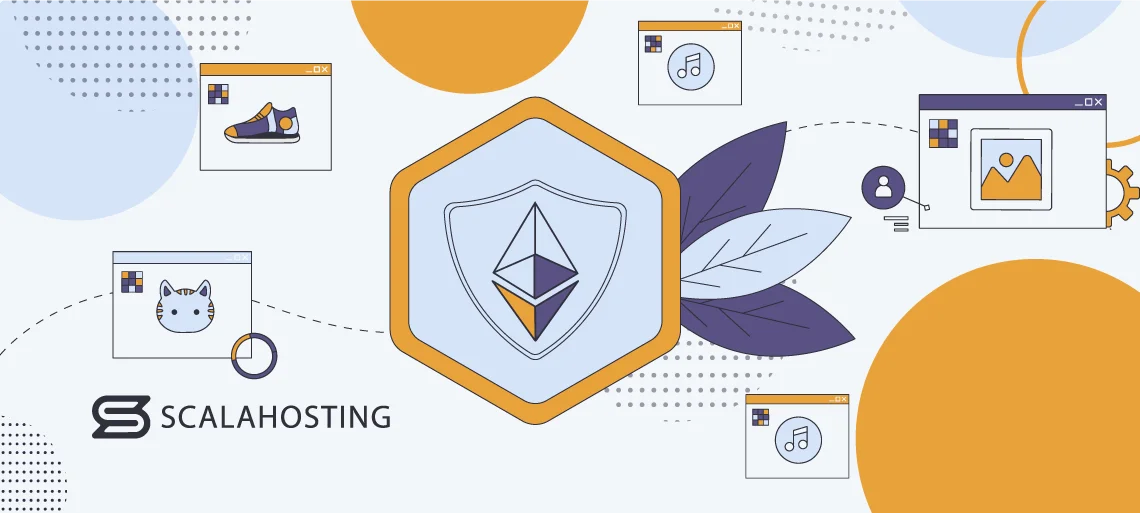
| Best Practice | What It Does |
|---|---|
| Signature and Authorization Audits | Review each authorization request and signature prompt before you approve them. That way, you’ll prevent scammers and hackers from accessing your NFT assets. |
| Use Hardware Wallets for Large NFT Investments | Experts recommend you use hardware wallets for substantial NFT investments because they store your private keys offline and cannot be hacked easily. |
| Conduct Frequent Audits | Audits help ensure there are no loopholes in your code. You should audit the NFTs and the additional sale/mint contracts. |
| Use Decentralized Storage for Metadata | Decentralized storage ensures that your NFTs’ unique traits aren’t susceptible to centralized points of failure. You can use platforms like IPFS, Filecoin, and Moralis. |
| Create Straightforward NFTs | Straightforward and clutter-free NFTs reduce the chances of vulnerabilities. |
| Use Established Standards | Use trusted standards that have been vetted by the community to avoid unforeseen vulnerabilities. |
Conclusion
Managed VPS hosting is the ideal service for you to create and host your NFT marketplace. It provides enhanced security, full root access, and excellent scalability, which are all critical for marketplace creation. It’s also more affordable than dedicated services and great for both small and large projects.
If you want to find the perfect managed VPS provider for your NFT marketplace, you should definitely consider ScalaHosting. Our managed cloud VPS comes at affordable prices, offers one-click scaling, and includes SShield, a powerful security solution that’ll keep your NFTs protected at all times.

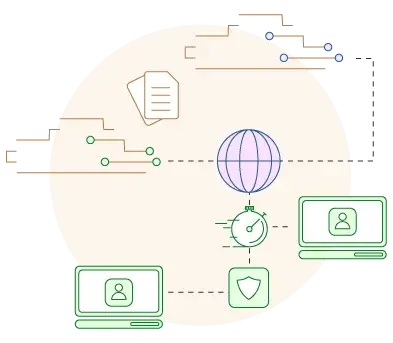
FAQ
Q: What is KYC and AML compliance in NFT marketplaces?
A: AML (Anti-Money Laundering) is a set of regulations. Unique NFTs are usually exempt from those regulations, but activities related to NFTs can be subject to them. KYC (Know Your Customer) procedures help NFT marketplaces comply with AML regulations as they help verify the identity of users, collect relevant information to prevent money laundering and other illegal activities, and assess risk profiles.
Q: How do you develop smart contracts for NFT minting?
A: To develop a smart contract for NFT minting, do the following:
- Define the NFT characteristics – specify the NFT name, image, description, and any associated metadata.
- Set up the minting process – define the process by setting up parameters like the number of tokens to be minted, the cost of mining, and the maximum supply.
- Establish ownership rights – NFT smart contracts must define the ownership rights associated with the NFT and include how they can be sold or transferred.
- Write the code – you must write the NFT smart contract code using a blockchain programming language like Solidity. You must also test if it functions as intended.
- Deploy the contract – once you write and test the code, you can deploy it on the blockchain, where it will execute automatically when someone mints a new NFT.
Q: What are the most important metrics to track for NFT marketing performance?
A: Some of the most essential metrics that’ll show you how successful your NFT marketing efforts include:
- Sales volume – shows the number of NFTs you’ve sold and the revenue you’ve generated from them.
- Website traffic – includes the number of visitors your marketplace has and where the traffic is coming from.
- Conversion rates – provides the percentage of marketplace visitors who buy your NFTs.
- Social media engagement – presents the number of likes, comments, and shares on your social media accounts that are linked to your NFT marketplace.
- Click-through rates – shows the percentage of people who click on your links in online marketing campaigns.
- Return on investment (ROI) – compares the revenue you’ve generated with the amount you’ve spent on marketing.


